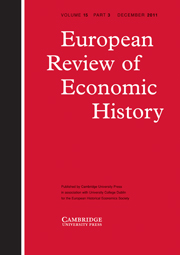Article contents
A very peculiar practice: Underemployment in Britain during the interwar years
Published online by Cambridge University Press: 20 April 2006
Abstract
This article presents new evidence on the determinants of short-time working in Britain during the interwar period. Using a selection of manufacturing industries we test the impact that output volatility, the benefit-wage ratio, and trade union density had on short-time working. We find that persistence effects (captured by lagged values of output fluctuation) and gender differences in trade union density were important for a number of industries. However, perhaps our most interesting finding is that the benefit-wage ratio also exercised a statistically significant impact on short-time working. This suggests that the Benjamin-Kochin thesis may be important after all. In other words, the army of short-time workers that existed in Britain between the Wars may, indeed, have been a ‘volunteer army’.
- Type
- Research Article
- Information
- Copyright
- Cambridge University Press 2006
- 7
- Cited by


